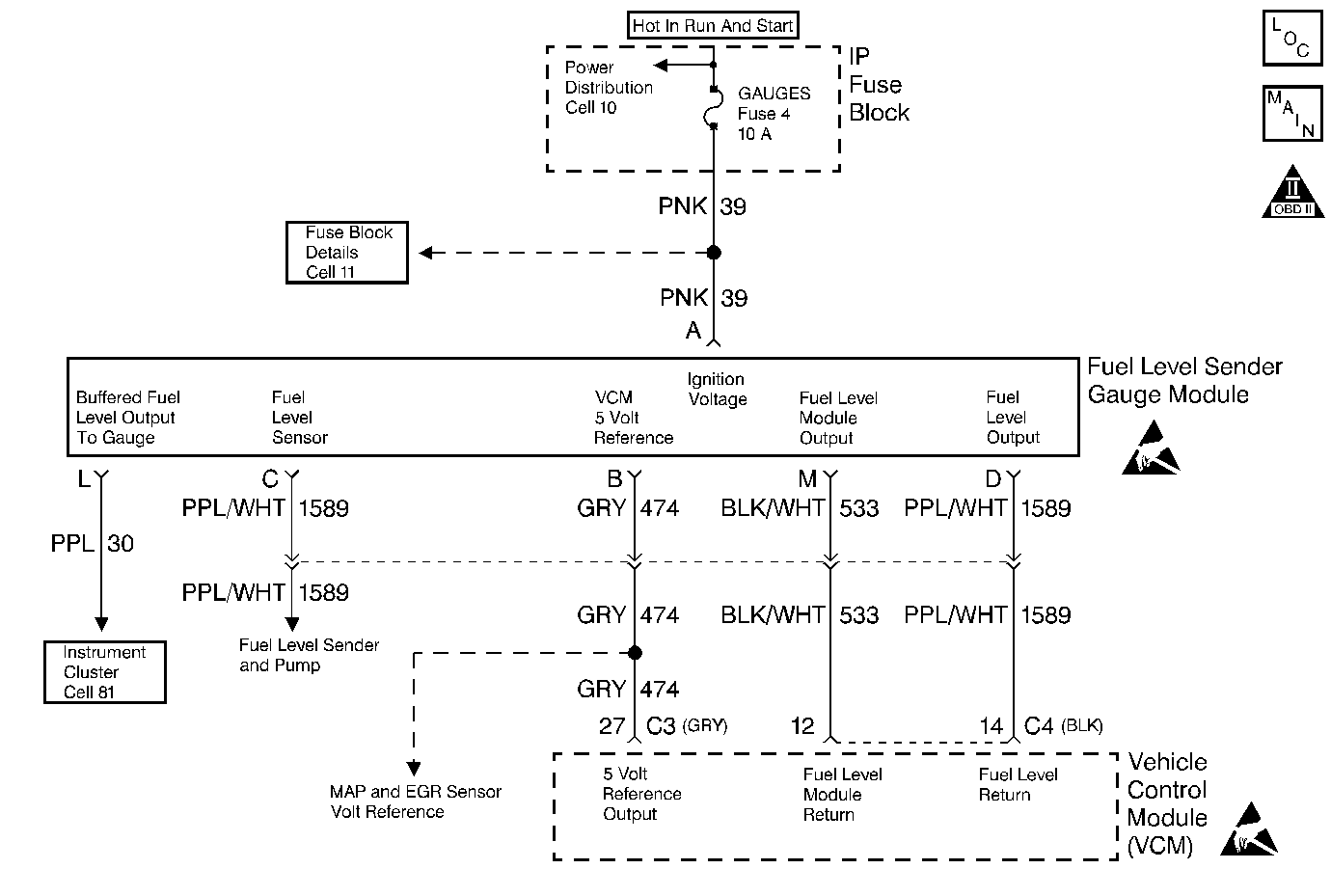
Circuit Description
The Fuel Level sensor is an important input to the VCM for the Enhanced Evaporative System Diagnostic. The VCM needs the fuel level information in order to know the volume of fuel in the tank. The fuel level affects the rate of change in the air pressure in the EVAP system. Several of the Enhanced Evaporative System Diagnostic sub-test are dependent upon the correct fuel level information. The diagnostic will not run when the tank is greater than 85% or less than 15% full. (This sensor signal disables the misfire when the fuel levels are less than 15%). This DTC is a type D DTC.
Conditions for Setting the DTC
| • | The Fuel Tank Level Slosh Test is completed. |
| • | The Fuel Tank Level Main Test is completed. |
| • | The Fuel Tank Level Data is Valid. |
| • | The Fuel Level signal voltage is greater than 2.9 volts for a period greater than 20 seconds. |
Action Taken When the DTC Sets
| • | The control module stores the DTC in history after the first failure but will not illuminate the malfunction indicator lamp (MIL). |
| • | The control module records the operating conditions at the time the diagnostic fails. The control module stores the failure information in the scan tools Freeze Frame/Failure Records. |
Conditions for Clearing the MIL/DTC
The VCM turns OFF the MIL after 3 consecutive driving trips without a fault condition present. A history DTC will clear if no fault conditions have been detected for 40 warm-up cycles (the coolant temperature has risen 22°C (40°F) from the start-up coolant temperature and the engine coolant temperature exceeds 71°C (160°F) during that same ignition cycle) or the scan tool clearing feature has been used.
Test Description
The numbers below refer to the step numbers in the diagnostic table.
-
This step checks the wiring, connections, and the VCM.
-
This step checks the wiring, connections, and the VCM.
-
This step checks the wiring, connections, and the VCM.
Step | Action | Value(s) | Yes | No |
|---|---|---|---|---|
1 |
Important: Before clearing the DTCs, use the scan tool in order to record the FReeze Frame and the Failure Records for reference. This data will be lost when the Clear Info function is used. Was the Powertrain On-Board Diagnostic (OBD) System Check performed? | -- | ||
2 |
Does the scan tool display the specified value | 99%-100% | ||
3 | Refer to the Fuel Sender Gauge Diagnosis. | -- | -- | -- |
4 | With a DVM to a ground, probe the fuel level sensor, cavity C, at the Fuel Level Sensor Gauge Module. Is the voltage greater than the specified value? | 2.9V | ||
Check for a short to voltage in the Fuel Level Input circuit. Was a problem found? | -- | |||
6 | With a DVM to a ground, probe the fuel level output, cavity D, at the Fuel Level Buffer Module. Is the voltage greater than the specified value? | 2.9V | ||
Check for a short to voltage in the fuel level output circuit. Was a problem found? | -- | |||
Check for an open in the Fuel Level Buffer Module sensor ground. Was a problem found? | -- | |||
9 | Repair the short to voltage in the fuel level input circuit. Refer to Wiring Repair in Engine Electrical. Is the action complete? | -- | -- | |
10 | Repair the short to voltage in the fuel level output circuit. Refer to Wiring Repairs in Engine Electrical. Is the action complete? | -- | -- | |
11 | Repair the open in the fuel Level Buffer Module sensor ground. Refer to Wiring Repairs in Engine Electrical. Is the action complete? | -- | -- | |
12 | Replace the VCM. Important: When replacing the VCM, the new VCM will need to be programmed. Refer to VCM Replacement/Programming . Is the action complete? | -- | -- | |
13 |
Does the scan tool indicate that this diagnostic Ran and Passed? | -- | ||
14 | Use the scan tool in order to display the Capture Info and the Review Info. Are there any DTCs displayed that have not been diagnosed? | -- | Go to the applicable DTC table | System OK |
